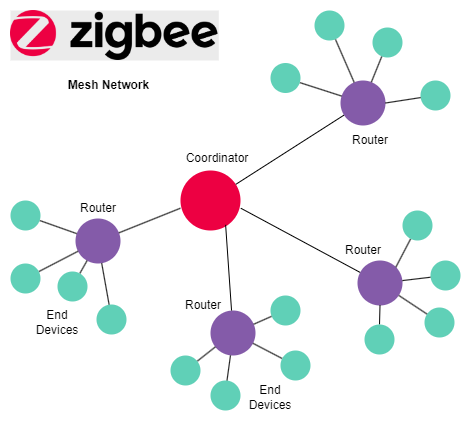What smart light switches are available?
Given that you probably searched Zigbee vs Z-Wave vs Wi-Fi (or some combination thereof) to get here, you probably already know what technologies are on offer.
I’m specifically looking at Zigbee vs Z-Wave vs Wi-Fi Smart Light Switches; This list will not include Bluetooth devices.
Zigbee
An open standard designed to be low cost, low power for IoT devices, Zigbee devices can run on battery power. The support for mesh networking improves reliability, but watch out for incompatibility between brands.
Z-Wave
Z-Wave is also designed to be low power for Home Automation devices.
The Z-Wave Alliance ensures compatibility between all devices using this protocol, adding extra fortification to the mesh networking they support.
Wi-Fi
Built on the IEEE standard, devices using Wi-Fi can connect directly with the internet. You probably already have good internet coverage in your house, so this is the most plug and play friendly option.
Where did I search?
I catalogued 70 different devices:
| Protocol | Count |
|---|---|
| Wifi | 34 |
| Zigbee | 25 |
| ZWave | 11 |
| Total | 70 |
Most of the products were found on Amazon. Anything that was difficult to establish which protocol it supported I immediately skipped.
I chose devices that replace built in switches within the house and hook into the mains. I did this for two reasons:
- For Zigbee and Z-Wave, devices attached to mains tend to be Routers, extending your network for end devices
- I never want to flick a switch to find the battery has depleted!
How much do they cost?
Z-Wave light switches are hard to find!
Not only that, they were also super expensive – The cheapest Z-Wave I found at £58 costs more than the most expensive Zigbee light switch at £40.
Where is everyone getting their Z-Wave switches from?
Wi-Fi is cheap
Wi-Fi light switches came in cheapest as well as most abundant. There were so many, reasonably priced and good stylish variety too.

Zigbee
Zigbee doesn’t win any awards here; it’s not the cheapest, it’s not the most interoperable and it’s not the most abundant either.
The only statistic it did come out best was the amount of discounts on Zigbee devices. Over a third were offering a discount! I hope that trend continues to other types of Zigbee devices.
I’d wager that would shoot up higher during Black Friday sales too.
| % Discounted | ❌ | ✔️ |
| Wifi | 88% | 12% |
| Zigbee | 64% | 36% |
| ZWave | 100% | 0% |
Price isn’t everything though, and there’s a wider reason that Zigbee light switches are what I’ll be choosing..
Conclusion
Ruling out Z-Wave
At this point I ruled out Z-Wave for light switches. They just seemed hard to find, wasn’t a wide variety and were expensive too.
I wonder if the people who use Z-Wave tend to use relays, or just don’t need them or something?
Ruling out Wi-Fi
There was so many Wi-Fi light switch devices and there were many different styles to choose from. Coming in with the cheapest price and being most readily available, I was very tempted to use these.
The main differences between Wi-fi and Zigbee or Z-Wave however, is that Wi-Fi uses a little more power with the advantage of being able to directly communicate with the internet.
The power requirements of Wi-Fi mean you won’t find many battery powered Wi-Fi devices though; and those you do will need said batteries replacing far more often.
Great for the price but not so for a complete home automation solution…
Zigbee, the smart choice
The great thing about Zigbee is the low power requirements, allowing the integration of little battery powered buttons, sensors and switches etc.
In order to achieve this however – you need a Zigbee network, which is created by purchasing and integrating mains connected devices that operate as routers. This extends the range and redundancy across the home.

So in order to have a bunch of battery powered devices, you essentially need to kit out at least part of your home with either Zigbee light switches or plug sockets.
And so that’s the plan!
Next I’m going to compare other Zigbee vs Z-Wave vs Wi-Fi devices to see if there’s a bigger picture I’m missing.
